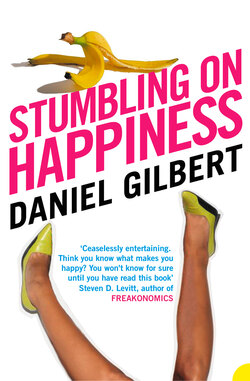Читать книгу Stumbling on Happiness - Daniel Gilbert - Страница 19
CHAPTER 2 The View from in Here
ОглавлениеBut, O, how bitter a thing it is to look into happiness through another man’s eyes!
Shakespeare, As You Like It
LORI AND REBA SCHAPPEL may be twins, but they are very different people. Reba is a somewhat shy teetotaler who has recorded an award-winning album of country music. Lori, who is outgoing, wisecracking and rather fond of strawberry daiquiris, works in a hospital and wants someday to marry and have children. They occasionally argue, as sisters do, but most of the time they get on well, complimenting each other, teasing each other and finishing each other’s sentences. In fact, there are just two unusual things about Lori and Reba. The first is that they share a blood supply, part of a skull, and some brain tissue, having been joined at the forehead since birth. One side of Lori’s forehead is attached to one side of Reba’s, and they have spent every moment of their lives locked together, face-to-face. The second unusual thing about Lori and Reba is that they are happy–not merely resigned or contented, but joyful, playful and optimistic.1 Their unusual life presents many challenges, of course, but as they often note, whose doesn’t? When asked about the possibility of undergoing surgical separation, Reba speaks for both of them: ‘Our point of view is no, straight out no. Why would you want to do that? For all the money in China, why? You’d be ruining two lives in the process.’2
So here’s the question: if this were your life rather than theirs, how would you feel? If you said, ‘Joyful, playful and optimistic,’ then you are not playing the game and I am going to give you another chance. Try to be honest instead of correct. The honest answer is ‘Despondent, desperate and depressed’. Indeed, it seems clear that no right-minded person could really be happy under such circumstances, which is why the conventional medical wisdom has it that conjoined twins should be separated at birth, even at the risk of killing one or both. As a prominent medical historian wrote: ‘Many singletons, especially surgeons, find it inconceivable that life is worth living as a conjoined twin, inconceivable that one would not be willing to risk all–mobility, reproductive ability, the life of one or both twins–to try for separation.’3 In other words, not only does everyone know that conjoined twins will be dramatically less happy than normal people, but everyone also knows that conjoined lives are so utterly worthless that dangerous separation surgeries are an ethical imperative. And yet, standing against the backdrop of our certainty about these matters are the twins themselves. When we ask Lori and Reba how they feel about their situation, they tell us that they wouldn’t have it any other way. In an exhaustive search of the medical literature, the same medical historian found the ‘desire to remain together to be so widespread among communicating conjoined twins as to be practically universal’.4 Something is terribly wrong here. But what?
There seem to be just two possibilities. Someone–either Lori and Reba, or everyone else in the world–is making a dreadful mistake when they talk about happiness. Because we are the everyone else in question, it is only natural that we should be attracted to the former conclusion, dismissing the twins’ claim to happiness with offhand rejoinders such as ‘Oh, they’re just saying that’ or ‘They may think they’re happy, but they’re not’ or the ever popular ‘They don’t know what happiness really is’ (usually spoken as if we do). Fair enough. But like the claims they dismiss, these rejoinders are also claims–scientific claims and philosophical claims–that presume answers to questions that have vexed scientists and philosophers for millennia. What are we all talking about when we make such claims about happiness?
